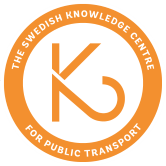Article highlighted
New research projects at K2

K2's research highlights problems defined in dialogue between researchers and pracitioners in and around public transport. The research is based on K2's research agenda. A decision has now been made on nine new smaller projects that will run in 2024.
A minute here or there - deeper understanding of the importance of time
The importance of travel time is crucial to many of the decisions made about the design of public transport. Travel time is generally seen as a sacrifice that needs to be minimised. This project will question old truths about the view of travel time, how it is perceived and ultimately how it is used in decision-making for the design of the transport system. The project includes project manager Joel Hansson and Helena Svensson and Andreas Persson, all from Lund University. The budget for the project is SEK 350,000.
Methods for tender evaluation in Swedish procurement of public bus transport
In Sweden, public transport is primarily organised in a way that regional public transport authorities procure services from commercial operators through an auction process. The project aims to identify how regional public transport authorities can improve the use of best price-quality ratio and examine how stakeholders in the Swedish bus industry perceive different evaluation methods and how they are applied. Project leader is Ivan Ridderstedt from the Swedish National Road and Transport Research Institute (VTI). The project also includes Roger Pyddoke (VTI) and Helene Lidestam (Linköping University and VTI). The budget for this project is SEK 344,543.
Punctual train traffic in metropolitan regions 3: Calibration and simulation of punctuality in train traffic around Stockholm, Gothenburg, and Malmö
Train traffic in Sweden faces numerous challenges. To be able to run more trains with acceptable quality, the so-called primary delays must be reduced. The project aims to simulate punctuality in the three metropolitan regions and to calibrate models for factors such as start, travel, and stop delays. The project includes project manager Carl-William Palmqvist from Lund University and Ingrid Johansson and Hans Sipilä, both from the KTH Royal Institute of Technology. The budget of the project is SEK 350,000.
Tensions in the development and implementation of digital policy Instruments for future mobility
As more vehicles become connected and road infrastructure becomes more sensor-rich, an increasing amount of data is being generated and published. The project aims to examine the "tensions" that arise in the design and use of standardised data streams between public and private mobility actors. This may include considerations about what data is reasonable to share. The project includes project manager Daniel Rudmark (VTI), along with Vasili Mankevich (University of Gothenburg) and Johan Sandberg (Umeå University). The budget for the project is SEK 346,080.
“FÖLJA”: Lasting change or temporary experiment? A study of a pilot project for transitioning to sustainable travel
Västtrafik is conducting a pilot project in 2023-2024 to create an integrated system for combined bike and public transport trips. This research project will document and analyse experiences from the pilot project, focusing on organisational learning and governance of public projects. Key questions include how the pilot project can contribute to a more lasting transition to sustainable travel and what are the conditions required for it to gain traction within the organisation. The project includes project leader Jens Alm and Karin Thoresson, both from VTI. The budget for this project is SEK 350,000.
Exploring Human Rights to Public Transportation: An Inquiry into the Right to Public Transportation and Urban Mobility as a Human Right
In many cities and regions worldwide, transportation systems reflect deep-rooted inequalities and discrimination. The purpose of this project is to explore how an human rights approach to public transport can help to advance the integration of equity and justice into public transportation planning and urban mobility policy. The project includes project leader Lina Olsson from Malmö University and Ren Thomas from Dalhousie University in Canada. The project has a budget of SEK 270,833.
New funds for public transport: A study of state interventions in the financing of public transport in Europe
Several European countries have introduced or are in the process of introducing new state funds and policies to finance public transport operations through various systems. These initiatives have also influenced debates in Sweden, where political parties and environmental organisations have argued for the need for similar systems for public transport. This project will map and analyse new state interventions to finance public transport operations in various European countries and explore their relevance to public transport in Sweden. The project will study nationally funded ticket strategies such as "Deutschland-Ticket" in Germany and "KlimaTicket" in Austria. The project includes project leader Jens Portinson Hylander from VTI and Till Koglin from Lund University.
Healthy Streets: Redefining the role of a transport authority to create an active city
Since 2017, a ‘Healthy Streets Approach’ has been at the heart of London’s transport strategy. Through this approach, Transport for London (TfL) is tasked with tackling the city’s ‘inactivity crisis’. This has required a major shift in thinking to reduce car dependency and increase the use of active and public transport. The project will examine this shift and explore what a public health focus means for TfL's role as a transport authority. It aims to provide lessons relevant to redefining the role of public transport in Sweden. The project is led by Russell Cannon and Chunli Zhao, both affiliated with Lund University.
Exploring Measures to Monitor Passenger-Centric Punctuality in Public Transport: A Pre-study
Traditionally, measures of punctuality have been mainly focused on vehicle arrivals. While such measures (partly) allow monitoring the vehicles’ punctuality from an operator’s perspective, they ignore much of the passengers’ perspective, including travel demand and how passengers value travel time. This project is a pre-study that aims to explore alternative approaches for monitoring punctuality in public transport. The focus is on reviewing alternative passenger-centric metrics and evaluating their feasibility, challenges, and potential for public transport in Sweden. The project is led by Abderrahman Ait-Ali from VTI.
